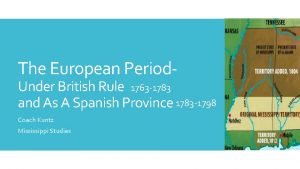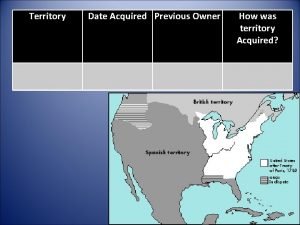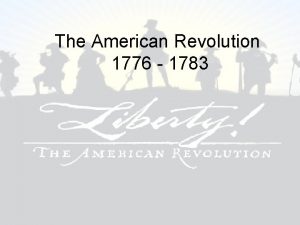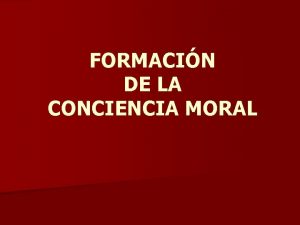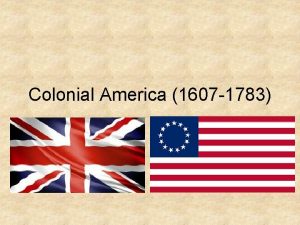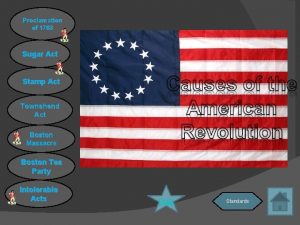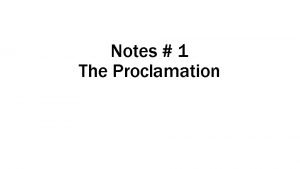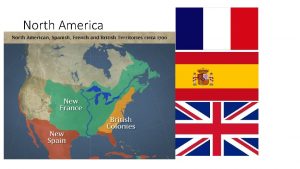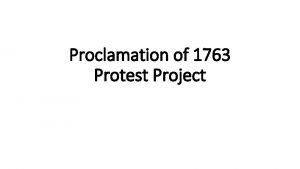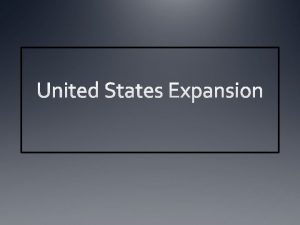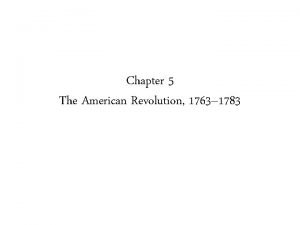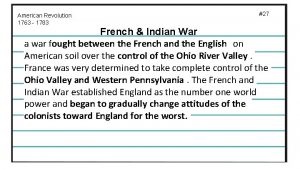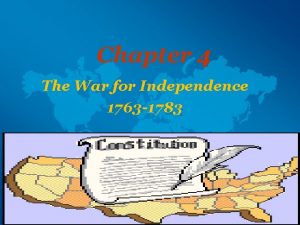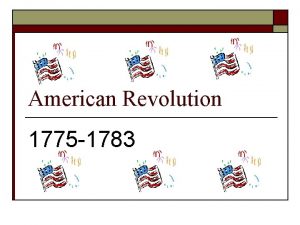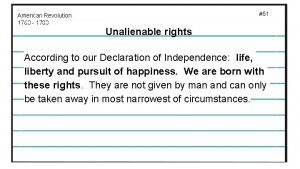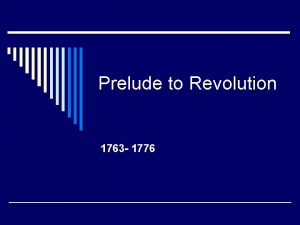The Revolutionary Era 1763 1783 What political social













- Slides: 13

The Revolutionary Era 1763 -1783

What political, social, and economic factors led to the American Revolution? �Britain reexamined its long-standing policy of salutary neglect. �Began enforcing old restrictions and issuing new ones �English political tradition emphasized limiting the power of the ruler (Magna Carta, English Bill of Rights, etc. ) � 1763 – Weak authority of royal governors was exposed (had to share power with colonial assemblies); Proclamation of 1763 led to colonial resentment

The Issue of Taxation �Stricter enforcement of the Navigation Acts �Sugar Act of 1764 – first act passed with the express purpose of raising revenue �Currency Act of 1764 – outlawed colonial issues of paper money �Stamp Act of 1765 – all printed materials had to be stamped indicating a tax had been paid to the Crown �Prime Minister George Grenville used concept of virtual representation to dismiss colonial concerns

The Stamp Act Congress �Delegates from nine colonies met to form a collective response to the Stamp Act �Petitioned King George III and Parliament asking for repeal of the act �Called for a boycott on all trade with Britain �Organized the Sons of Liberty to pressure merchants to honor the boycott �Colonial women made homespun woolen garments �Stamp Act was repealed in 1766

Trouble in Boston �Townshend Acts of 1767 – imposed an import duty on glass, paper, and tea (indirect tax paid at American ports) �British troops sent to Boston in 1768 �Boston Massacre of 1770 – first time disputes over taxes led to bloodshed �Britain repealed the Townshend Acts, except for the tea tax

Response to the Townshend Duties �Sons of Liberty organized a another boycott of British goods �Issued a circular letter from the Massachusetts House of Reps to protest the Townshend Acts �This “seditious letter” was considered an act of treason & the Massachusetts colonial assembly was dissolved

Response to the Townshend Duties �Effect: Effect �The crisis over colonial representation was now evident �Colonies began communicating with each other effectively via committees of correspondence �Colonies became united in their “moral” opposition to these English abuses

Trouble in Boston �Tea Act of 1773 – tea could be sold in America only by the East India Company �Actually lowered the price of tea, but colonists still argued “taxation without representation” �Tea shipments sent to four cities – New York, Philadelphia, Charleston, Boston �December 16, 1773 – The Boston Tea Party

Coercive (Intolerable) Acts �Parliament retaliated against this act of insubordination with the Coercive Acts in 1774: �Closed the port of Boston until the destroyed tea was paid for �Massachusetts town meetings were limited to once per year �New England, Middle, & Southern colonists rallied to support Boston

The Quebec Act (1774) �The Quebec Act created a gov’t for newly ceded Canada…but it lacked a colonial assembly �Colonists interpreted this as final proof of a Parliamentary plot to “enslave” America


Colonial Unity �First Continental Congress – 1774 �Delegates from 12 colonies met in Philadelphia �Delegates included Patrick Henry, George Washington, John Adams, and Sam Adams �Resolved to send a Declaration of Rights to the King �Placed a boycott on British goods �Planned to call for a Second Continental Congress in May, 1775 �Lord North declared the Congress an illegal assembly

Loyalists and Patriots �Loyalists included British-appointed government officials, Anglican clergy, merchants whose trade depended on good relationships with Britain, and some slaves who believed Britain would pursue antislavery policies �Patriots included the colonial elite, urban artisans, Congregationalists, Presbyterians, and merchants who dealt in American commodities
 Under british rule, 1763-1783
Under british rule, 1763-1783 Who was the previous owner of oregon country
Who was the previous owner of oregon country Catecismo de la iglesia 1783
Catecismo de la iglesia 1783 Us in 1783
Us in 1783 Catecismo de la iglesia 1783
Catecismo de la iglesia 1783 Us in 1783
Us in 1783 1783-1607
1783-1607 Treaty of paris 1783 apush
Treaty of paris 1783 apush Proclamation of 1763 picture
Proclamation of 1763 picture What did the proclamation of 1763 forbid
What did the proclamation of 1763 forbid Proclamation of 1763
Proclamation of 1763 The albany plan of union
The albany plan of union Ohio river valley 1763
Ohio river valley 1763 Proclamation of 1763 protest poster
Proclamation of 1763 protest poster
